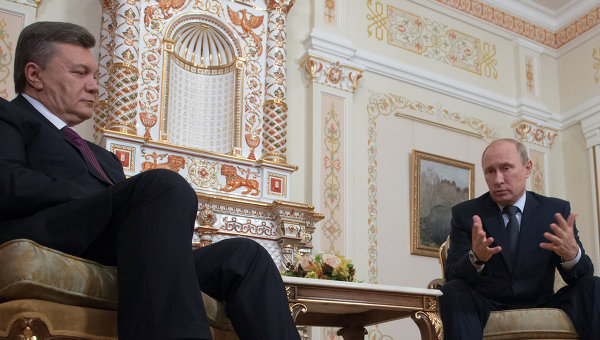
Russian Policy Toward Ukraine: What Next After EuroMaidan?
Publication: Eurasia Daily Monitor Volume: 10 Issue: 221
By:

After President Viktor Yanukovych’s failure to sign the Association Agreement with the European Union at the November 28–29 Eastern Partnership summit in Vilnius, Russian pressure on Ukraine seemingly eased. But in fact, Moscow’s political influence remains at an elevated level, which challenges not only Ukraine, but also the EU and the United States. Russia and Germany are emerging as pro-active players in the “Ukrainian Issue” talks, while the US is distancing itself from an active regional role.
Yanukovych briefly met with Russian President Vladimir Putin in Sochi on December 6, amidst Ukraine’s domestic political crisis. This meeting caused much speculation in the Ukrainian media about whether Yanukovych allegedly agreed to join the Customs Union of Russia, Belarus and Kazakhstan by 2015 in exchange for reduced natural gas prices and $5 billion in Russian financing. However, the following day, Putin’s press secretary Dmitry Peskov and later Yanukovych’s press service denied that Ukraine’s joining the Customs Union was on the agenda. Talks, they stressed, focused solely on bilateral cooperation in financing, technology and industrial areas with a special emphasis on energy sector cooperation (https://ria.ru/politics/20131207/982634102.html; https://www.president.gov.ua/news/29705.html).
Yanukovych, reportedly, will travel to Moscow on December 17. A Ukrainian government source told UNIAN on December 10 that, during his visit, the Ukrainian president might sign several deals on the economy, industrial cooperation and trade. These will apparently include a “document providing for the substantial reduction of natural gas prices” (though an accord on this has yet to be reached), as well as an agreement to renew the production of Ruslan Antonov 124 aircraft with Ukrainian D 18T engines and their modifications
(https://korrespondent.net/business/economics/3275609-yanukovych-y-putyn-v-moskve-podpyshut-trynadtsat-sohlashenyi-ystochnyk).
These pre-announced agreements reflect Moscow’s key points of leverage on Ukrainian-Russian relations and, in fact, explain how Russia was able to push Ukraine into suspending its EU integration process. Namely, these are Moscow’s offer to re-negotiate the 2009 gas supply contract with Ukraine, cooperation in the aerospace sector if Kyiv turns away from Europe, and the suspension of trade sanctions toward Ukraine.
Perhaps the most important of these for Ukraine is the reduction of the natural gas price—combined with some promise of continued high volumes of Russian gas transiting through Ukraine onto European markets—which would have a substantial positive fiscal impact on the Ukrainian economy. The idea of a consortium to jointly manage Ukraine’s gas transportation system may, therefore, resurface. Russia, on the other hand, has an economic incentive to reduce the gas price so as not to lose a major customer (Interfax-Ukraine, December 10). Yet, Russia could also demand that Ukraine first exit the EU Energy Community and back away from implementing the EU Energy Packages. Fear of such an outcome has apparently persuaded Germany to push for its inclusion in the proposed hypothetical Russian-Ukrainian pipeline consortium (ICTV via Interfax-Ukraine, December 10).
Reaching such deals with Ukraine will require that Yanukovych’s government survives the current political crisis, exemplified by the mass “EuroMaidan” protests in Kyiv (see EDM, December 9). Political expert Volodymyr Fesenko told Jamestown on December 9, “Putin, as much as he can, will support Yanukovych’s survival and Maidan’s failure via [economic deals], politics, cooperation among special services, etc.” The Kremlin has three key objectives: 1) to induce Kyiv to move away from the EU, 2) to affirm Russia’s regional predominance and “sphere of influence” over the post-Soviet space, and 3) to send a message of support to the “hawks” in the Ukrainian government who favor forcefully dealing with the democratic protests.
While stressing its support for Ukraine’s European integration, the US government also seems, perhaps inadvertently, willing to recognize Russia’s special influence. At a December 9 meeting in Moscow before visiting Kyiv, “Assistant Secretary Nuland expressed U.S. deep concern about the situation in Ukraine, and urged Russia to use its influence to press for peace, human dignity and a political solution,” (https://www.state.gov/r/pa/prs/ps/2013/218530.htm). Washington’s soft attitude toward Russia was noticed in Ukraine. Political consultant and expert Mykhailo Pogrebinskiy argued: “if [US President Barack] Obama’s administration was really seriously interested in Ukraine signing the Association Agreement with the EU, the decision to support [Ukraine] in this issue would have been taken earlier and not ‘on the last day.’ In addition, the US could have then persuaded the IMF [International Monetary Fund] to stop putting unmanageable demands before Ukraine and grant it financing” (https://www.unian.net/news/608080-tsena-otkaza-na-chto-ukraina-menyaet-evrointegratsiyu.html)
While the United States backs away from exerting its political will in the region, Moscow tolerates particularly harsh attitudes in the Russian media toward Ukraine’s protesters, EU integration, the Ukrainian authorities and, increasingly, officials from the EU and its member states. Illustratively, on December 9, Russian TV anchor Dmitry Kiselev—notorious for making inflammatory statements about the Ukrainian protests and the West’s purported role in them—was named head of the newly created state-run Russia Today international media agency. Nezavisimaya Gazeta chief editor and proprietor Konstantin Remchukov called Kiselev’s appointment a sign of the Kremlin’s new ideological strategy to underscore the West’s divisions and lack of unity (https://www.ng.ru/politics/2013-12-09/100_echo091213.html).
Meanwhile, as Russian rhetoric becomes increasingly “hawkish,” some Moscow-orientated Ukrainian elite are becoming emboldened in supporting pro-Russian policies. The leader of the pro-Russian political organization “Ukrainian Choice,” Viktor Medvedchuk, virtually endorses Moscow’s gas policy interests. In a Kommersant-Ukraine piece he writes, “Abiding by EU directives […] Ukraine will automatically deprive Gazprom of the opportunity to establish joint ventures in the gas sector on [Ukraine’s] territory” (https://www.kommersant.ua/doc/2363677). Likewise, Ukraine’s Prime Minister Mykola Azarov promoted Russia’s strategic policy on December 7 when he called for trilateral (Ukraine-Russia-EU) consultations before pursuing a visa-free regime with the EU (https://www.kmu.gov.ua/control/uk/publish/article?art_id=246904328&cat_id=244276429). Earlier, Russian presidential advisor Sergei Glaziev expressed concern that Kyiv’s EU integration might eventually lead to Ukraine entering the EU Schengen Area, thus forcing the introduction of visas with Russia, which does not yet have a visa-free regime with the EU
(https://www.pravda.com.ua/rus/news/2013/10/9/6999665/view_print/).
Vladimir Putin’s rather inactive reaction to the EuroMaidan events to date—his characterization of the protests as “pogroms” (see EDM, December 5), notwithstanding—attests to the fact that Russia had not expected such wide popular support for European integration in Ukraine. At this point, the protestors’ agenda of support for European integration seems to be gradually shifting toward addressing the country’s general political and economic problems. And while Russia’s increased hard-line policy on Ukraine is prone to failures, the deepening of the crisis and some further weakening of the Ukrainian government could give Russia more short-term control over Kyiv’s affairs.




